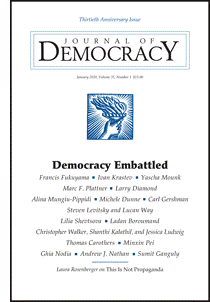
The crisis of liberal democracy cannot be blamed on the development and prevalence of digital technology, as is sometimes asserted or more often implied. Rather, the crisis has deeper causes about which there is little consensus, with views dependent on normative assumptions about democracy that are ultimately political, according to a new analysis from Chatham House, the London-based foreign policy think-tank.
While some attribute this crisis to the rise of populist figures, movements and parties, others see populism as a response to a deeper hollowing out of democracy during the last several decades, argues analyst Hans Kudnani, author of The Future of Democracy in Europe.
 In 2010, there was much discussion of what Larry Diamond, the editor of the National Endowment for Democracy’s Journal of Democracy, called ‘liberation technology’. New digital tools, he wrote, would empower citizens to ‘report news, expose wrongdoing, express opinions, mobilize protest, monitor elections, scrutinize government, deepen participation, and expand the horizons of freedom’, he observes:
In 2010, there was much discussion of what Larry Diamond, the editor of the National Endowment for Democracy’s Journal of Democracy, called ‘liberation technology’. New digital tools, he wrote, would empower citizens to ‘report news, expose wrongdoing, express opinions, mobilize protest, monitor elections, scrutinize government, deepen participation, and expand the horizons of freedom’, he observes:
Some blame the development of digital technology – in particular the emergence of social media – while others argue that the correlation between the development of digital technology and the perceived corrosion of democracy is exaggerated or that it has facilitated greater participation in politics from traditionally under-represented demographics in a way that was not previously possible. Nevertheless, it is clear that digital technology is transforming society, and in particular the public sphere, in ways that are not yet fully understood. The development of technology should not be seen as an irresistible force that cannot be shaped. At the same time, attempts to harness digital innovations in democracy will necessarily take place under conditions of uncertainty.
A March 30 webinar will discuss how liberal democracy is evolving against the background of social and technological change. What are the challenges to liberal democracy in Europe? How should we understand the impact of technology on how democracy in Europe functions? Given the plurality of democratic structures and institutions across the continent, how can democracy in Europe be reinvigorated? RTWT







